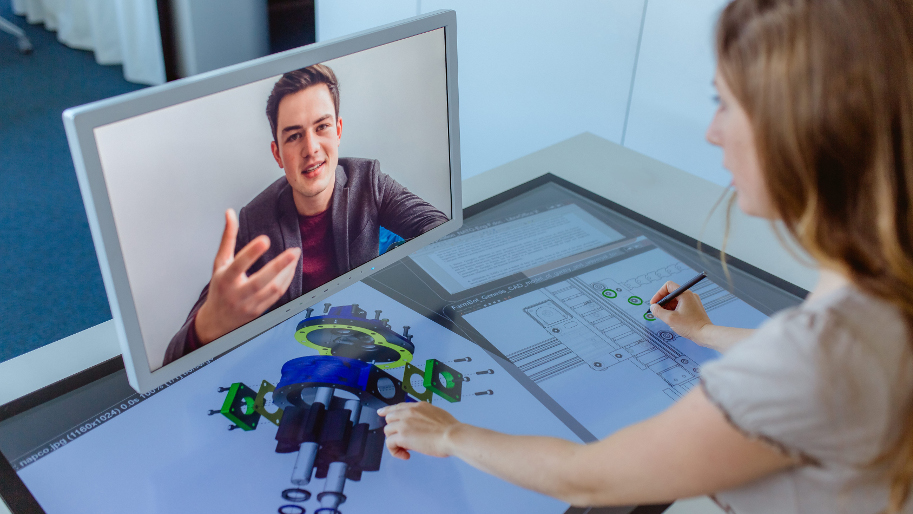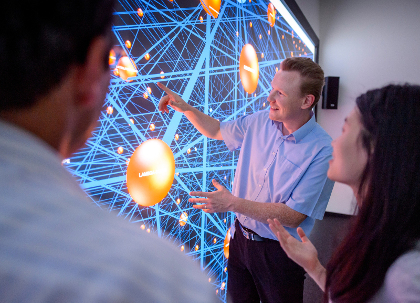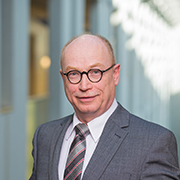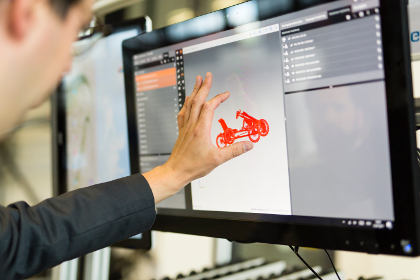Rethinking the Way We Work
 © Fraunhofer IAO/Ludmilla Parsyak
© Fraunhofer IAO/Ludmilla Parsyak
Politics, science and business are engaging in extensive cooperation and focusing on international developments to enable innovative work.
- „Working Life of the Future“
- Universities with a Highly Practical Orientation
- Innovation Leaders from Business and Science
Digitization knows no bounds. It encompasses the worlds of education and work and will shape future developments worldwide. Germany is engaged in a comprehensive discussion of the opportunities and challenges of digitization – and in the process is also sharing ideas and experiences with its international partners.
Spotlight on Brazil
At two prominent events during the Brazilian Year of Science 2018, participants are exploring digitization in the domains of work, research and education: at the 70th annual meeting of the Brazilian Society for the Advancement of Science (SBPC) and during the 7th German-Brazilian Dialogue on Science, Research and Innovation. Both events are initiatives of the German Centre for Research and Innovation (DWIH) São Paulo, which is funded by Germany’s Federal Foreign Office.
“Germany is a highly-industrialised and productive country in which the topic of Industry 4.0 is already very advanced”, said Ronald Dauscha, director of the Fraunhofer Liaison Office in Brazil, in an interview with the DWIH São Paulo. Explaining that people in this South American country are still somewhat more sceptical, Dauscha adds: “The public sector has recently commissioned many studies relating to this issue. Brazil does not wish to miss out on this historic opportunity”.
“Working Life of the Future”
It is no coincidence that the global DWIH network is addressing the far-reaching changes to the world of work. The DWIH are all about international and interdisciplinary exchange: “Interlinking the international activities of German universities, non-university research institutions and research-based companies at strategic locations is one of the unique features of the DWIH”, explains DAAD President Professor Margret Wintermantel. And the digitization of the working world is significant on many levels – it has very concrete consequences, such as for factories and production processes, while at the same time entailing an ongoing process of reflection and engagement.
The German Science Year 2018 is dedicated to the “Working Life of the Future,” featuring numerous events at which, for example, cyber-physical systems will be discussed, as will digitally-supported learning in outpatient care. The new “Future of Work” program launched by Germany’s Federal Ministry of Education and Research (BMBF) highlights the importance of social innovations in the digitized world of work, stressing that: “We promote projects that exemplify how employment will be safeguarded, working conditions improved and productivity increased in tomorrow’s digital working world.”
Universities with a Highly Practical Orientation
The future of work is being analysed and reflected upon at German universities – and at the same time tested out and explored in practical scenarios. The demonstration factory at RWTH Aachen, for instance, illustrates the principle of Industry 4.0. In cooperation with partners from other universities and industry, sheet-metal production processes in genuine factory situations are reproduced.
Meanwhile, TU Dortmund University is exploring new forms of industrial work in a major social science research program. How, for example, will the qualifications required by workers change? Professor Hartmut Hirsch-Kreinsen, whose research project “Changes in Production Work” is being supported by the Deutsche Forschungsgemeinschaft (DFG), emphasizes the opportunities offered by digitization: “It is true that jobs have often been rendered superfluous by automation in the short term; however, this has always been offset by the creation of new jobs. There is no reason not to think that this will continue to be the case in the future.” Hirsch-Kreinsen believes that it is not automation that determines the relationship between humans and machines, “but the political and social decisions about how this technology is implemented”.
Open Hybrid LabFactory
At the Open Hybrid LabFactory research campus at Technische Universität Braunschweig, innovative lightweight construction concepts are being created – working closely with partners from industry. The development process involves a high degree of automation and practical trials of human-robot collaboration.
 In Germany, this issue is being tackled at the political level. In the “Guidelines for the Digital Transformation” that they issued in 2017, Germany’s three Federal Ministries for Economic Affairs and Energy, of Labour and Social Affairs, and of Justice and Consumer Protection stress the following: “A forward-looking response involves preparing employees for a dynamic transformation of the world of work and creating structures that will enable them to maintain their qualifications and employability throughout their professional careers.” How companies can responsibly implement automation, robotization and artificial intelligence was one of the central questions discussed at the 2018 conference of the Global Compact Network Germany, which receives a large part of its funding from the Federal Ministry for Economic Cooperation and Development and the Federal Foreign Office.
In Germany, this issue is being tackled at the political level. In the “Guidelines for the Digital Transformation” that they issued in 2017, Germany’s three Federal Ministries for Economic Affairs and Energy, of Labour and Social Affairs, and of Justice and Consumer Protection stress the following: “A forward-looking response involves preparing employees for a dynamic transformation of the world of work and creating structures that will enable them to maintain their qualifications and employability throughout their professional careers.” How companies can responsibly implement automation, robotization and artificial intelligence was one of the central questions discussed at the 2018 conference of the Global Compact Network Germany, which receives a large part of its funding from the Federal Ministry for Economic Cooperation and Development and the Federal Foreign Office.
Innovation Leaders from Business and Science
The future of work is a challenge that requires a cross-cutting approach. It will be overcome if innovation leaders from business and science engage in successful collaboration – and if they are provided with positive political framework conditions. One good example of how this can work is the creation of Cyber Valley in the Stuttgart-Tübingen region, one of Europe’s largest collaborative research projects in the area of artificial intelligence.
With funding provided by the state of Baden-Württemberg, Cyber Valley combines and interlinks the activities of international companies such as Amazon, BMW and Bosch, as well as the work conducted at the universities in Stuttgart and Tübingen and at the Max Planck Institute for Intelligent Systems. “Cyber Valley is designed to be a place where the technological foundations for our digital future are laid”, said Max Planck Society President Professor Martin Stratmann at the opening of the innovation centre.

“We want not only to attract and hone the talents of the best young scientists, but also to create spaces in which to engage in dialogue with people – as the digital future will affect us all.”Prof Dr Martin Stratmann, President of the Max Planck Society

